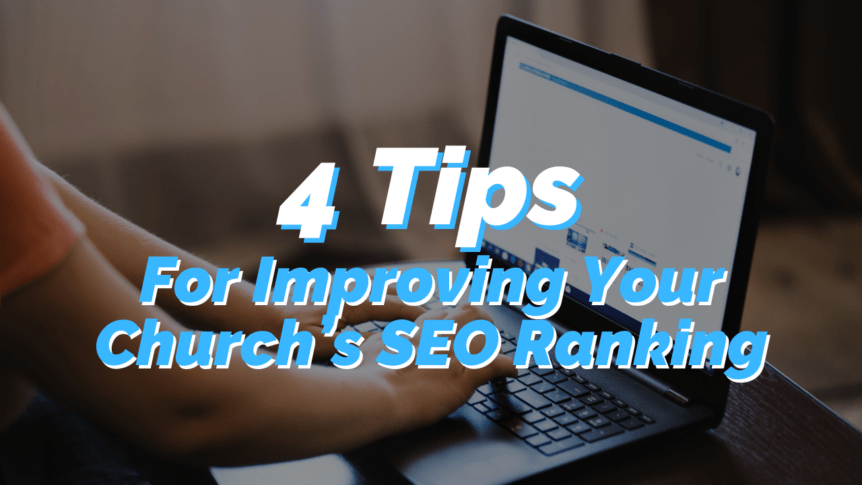Church Website SEO (Search Engine Optimization) is more important today that it ever has been. It is the way we learn about just about everything. Need a plumber? Google it. Want to know if a restaurant is any good? Ask Siri. This is how we make decisions.
The bigger the decision, the more likely someone is to start with an online search. If people are unwilling to go to a restaurant before they check out the reviews online, they are certainly going to do several searches before they buy a car or a new home.
And one of the biggest (and best) decisions anyone will make in their life is to get involved with a local church. If we believe that to be the case, it is naive for us to ignore the place where people are making their first encounter with our churches. For most people, their very first impression is happening on a search engine’s local search results.
Church website SEO is directly tied to a church’s online visibility. Let’s explore more about what SEO is and how your church can use it to your advantage. Then, we’ll go over four powerful tips to improve your SEO ranking so you get more traffic than ever before.
Ready to get started? Let’s dive in.
Estimated reading time: 11 minutes
Table of contents
Church SEO Overview

Let’s begin by covering everything you need to know about SEO. What it is, why it’s important, and how you can get started using it. We aren’t being dramatic when we say that SEO is hugely important for your church’s online visibility. So let’s jump in and learn everything we need to know.
What is SEO?
Search Engine Optimization (SEO) is the process of enhancing your website to make it more visible when people search for related topics on search engines like Google. The goal of SEO is to attract more visitors to your site by improving its ranking in search engine results.
There are various aspects to SEO, including the use of keywords, creating high-quality content, and ensuring your website is technically sound. For local churches, this means optimizing your online presence so that when someone searches for a church in your area, your church appears at the top of the search results.
Why is SEO for Churches Important?
SEO is crucial for churches because it helps you reach more people in your community. When someone is looking for a local church, they typically turn to search engines. If your church’s website appears high in the search engine results, more people are likely to visit your site and learn about your services, events, and mission. A well-optimized website can lead to increased attendance and greater engagement within your community.
Additionally, having a strong online presence through SEO can help you stand out in local directories and on platforms like Google Business Profile, making it easier for people to find and connect with your church.
According to LinkedIn, the highest ROI (return on investment) for your website is through organic searches, rather than things like paid advertising or social media.

This means that focusing on SEO is the best way to immediately improve your website’s visibility online. It is more effective than even paying for advertising.
How to Get Started
Getting started with SEO for your church involves a few key steps:
- Claim and Optimize Your Google Business Profile: Ensure your church is listed on Google Business Profile. Fill out all the information accurately, including your address, service times, contact details, and photos. This helps your church appear in local searches and Google Maps.
- List Your Church in Local Directories: Submit your church’s information to local directories like Yelp, Yellow Pages, and other local listing services. Consistent information across these platforms boosts your visibility and credibility.
- Optimize Your Website for Keywords: Identify keywords that people might use when searching for a local church. Include these keywords in your website’s content, titles, and meta descriptions. For example, phrases like “local churches near me” or “church services in [your city]” can help attract local traffic.
- Create Quality Content: Regularly update your website with engaging content. This could include blog posts, event updates, and sermons. High-quality content that answers questions or provides valuable information can improve your search rankings.
- Focus on Technical SEO: Ensure your website is technically sound. This includes having a fast-loading site, mobile-friendly design, and secure connections (HTTPS). Technical SEO helps search engines easily crawl and index your site, improving your rankings.
- Build Backlinks: Encourage other reputable websites to link to your church’s site. Backlinks from trusted sources can significantly boost your SEO. This can be achieved by partnering with local organizations, writing guest posts, or getting listed in community resource pages.
By following these steps, your church can improve its online visibility, attract more visitors, and foster a stronger connection with your local community. SEO is an ongoing process, so regularly review and update your strategies to maintain and enhance your search engine rankings.
Top 4 Tips to Improve Your SEO Ranking

Now that we have a full understanding of what SEO is and why it’s so important, let’s explore four tips to improve your church’s ranking in local searches. It is more important than ever to get your church online, and this is how you can make it appear at the top of that search bar.
1. Start A Blog
Starting a church blog is probably the best thing you can do to improve your search rankings for local SEO. There is a saying in the industry: “Content is King.” This is as true today as it has ever been.
Churches are notorious for using the Ronco Rotisserie method of managing their church websites. They just set it and forget it. You can have the nicest looking website, but if you don’t create new content for it regularly, search engines will assume that not much is happening at your organization. You will start to see your search engine rankings decline.
A blog is the perfect place to communicate with your church and it has the added benefit of being full of the one thing that search engines love the most – Text. Pictures and video or important too, but we need to remember that search engines can only index the text they find on your site.
Now before you start a blog make sure you count the cost. The only thing worse than not having a blog on your site is having a blog that only gets updated every 14 months. One thing I know about pastors is that we are busy people. So make sure you come up with a plan before you jump in head first.
Consider building a church blog team. This can be your church staff, or anybody you trust to write on things that are important to the people of your church.
As far as what platform to use, we strongly encourage you to use WordPress. It is flexible, easy to use, and the most search engine friendly platform bar none.
2. Use Social Media
Your church is already using social media. Please don’t tell me you aren’t. Social media channels like Facebook, Twitter, and Instagram are fantastic tools for communicating with your church as well as your community at large. If you are not using these channels, you need to start today. They are vital for your church’s online presence.
In addition to being a fantastic tool for communication, as of 2014 Google started putting a lot of weight on social media presence in its ranking algorithm. The logic is simple. If an organization has a lot of followers on Facebook and Twitter, and there is a lot of content being created there, they probably are an important player in that industry. Thus they should be given a higher rank. If you are ignoring your social media accounts you are lowering your search engine rankings when people look for churches.
Also, don’t forget the other sites out there that aren’t your traditional social media channels. Yelp is a very important directory with social components. It plays a big part in googles search rankings. I know it’s weird to have people rank your church on Yelp, but getting on there and registering with Yelp can make a big impact.
3. Use Video
When I started doing web development for churches, using video on your website was only something that mega churches could afford to do. For small and medium sized churches the equipment alone made filming services cost prohibitive.
Today, it is easier and more affordable than ever to create video and it costs you nothing to have it online. Platforms like YouTube and Vimeo have made video easy to put online and share with friends.
Search engines love video content. Like social media, videos with a lot of views indicate they are from an organization with a large online presence. This gives you a better search engine ranking.
The obvious place to start for churches is filming your services, but don’t think that is the only kind of video you can make. Welcome videos, testimony videos, footage from church events, and promo videos all can make an enormous impact. Maybe even consider doing a video devotional. Remember we are in a time where people value authenticity just as much as slick production value. Sometimes a pastor sharing from his heart at a desk can make a big impact.
4. Get Google Ad Grants
This last one isn’t technically an SEO tip but falls under SEM (Search Engine Marketing). When you do a search, usually the first few links on the top and a few on the sides are paid advertisements. Many people are unaware that Google’s primary business is in advertising. They make over a billion dollars each month selling those ads you see on the side of your searches.
For most churches paying for those ads is not an option. Thankfully, Google offers Ad grants to nonprofits in order to help them get onto their search engines and be a force for good. Churches are eligible and the opportunity is huge. Google gives churches $10,000 each month in free advertising on their search engines. Yes, I said $10,000 each month. No, I am not kidding.
I am going to go out on a limb here and say it would be an act of poor stewardship to know about this and not to take advantage of this opportunity. There are a few hoops to jump through as there are with any grant, but once you get through it the rewards are amazing. At REACHRIGHT we offer plans to help churches manage their google ad grants, or you can go it alone.
At my church – Journey Church Madison – We nearly tripled our website visits when we started taking advantage of the grant. That translated into a huge uptick in visitors. We even saw searchers get onto our website and make donations to some of our local missions initiatives without ever stepping foot in our church.
You need to get a grant. Today! We can show you where to start.
Church Website SEO

Improving SEO for your church is an ongoing journey that requires patience and dedication. Starting a blog can keep your website fresh with engaging content, helping attract and retain visitors. Leveraging social media platforms can amplify your reach, allowing you to share events, sermons, and updates with a broader audience.
Incorporating video content, such as recorded sermons or community events, can also enhance your online presence and engagement. Additionally, applying for Google Ad Grants can provide your church with free advertising, driving more traffic to your website.
By combining these strategies with core SEO practices like optimizing your Google Business Profile, listing in local directories, and maintaining a technically sound website, you’ll create a robust online presence. These efforts will help your church connect with more people in your community, fostering growth and engagement. Stay committed to these strategies, and you’ll see a positive impact on your church’s reach and influence.
What do you think? Did we miss any church website SEO strategies that you have worked for you?




